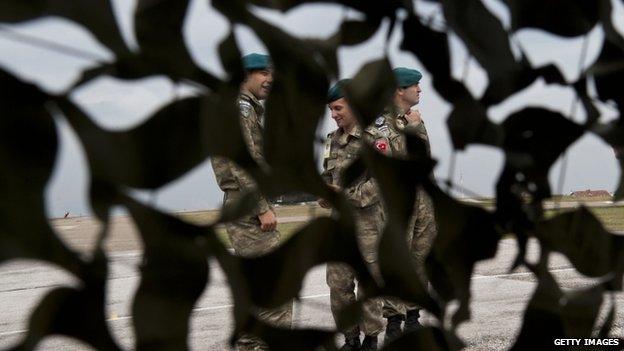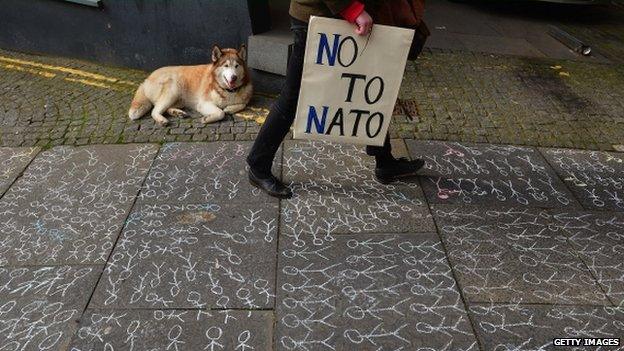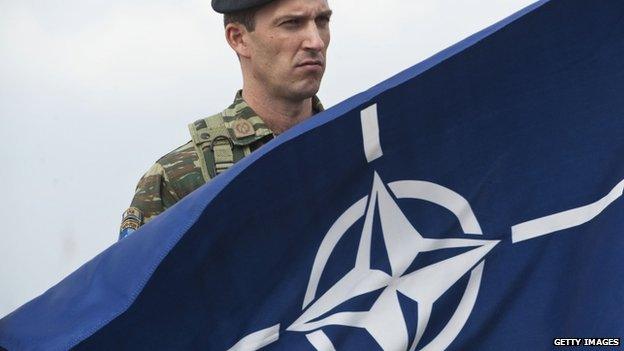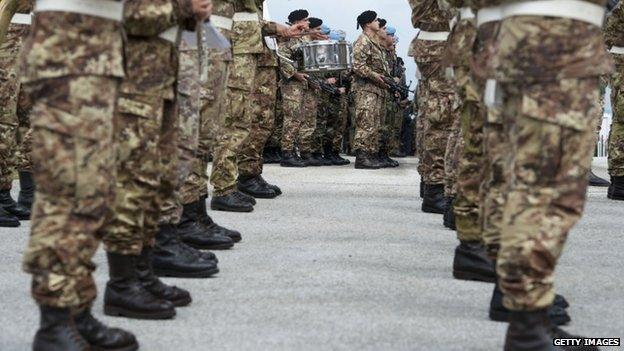Daily question: What is Nato and would an independent Scotland join it?
- Published
As the people of Scotland weigh up how to vote in the independence referendum, they are asking questions on a range of topics.
In this series, we are looking at those major questions and by using statistics, analysis and expert views shining a light on some of the possible answers.
As members of military alliance Nato begin a two-day summit in Newport, Wales, we look at the organisation and examine the issue of whether an independent Scotland would be a member.
Do you have a referendum question? Let us know by....
Emailing newsonlinescotland@bbc.co.uk.
We can also be found on Twitter @bbcscotlandnews, external
And on Facebook, external.
BBC news website users have been asking questions about Nato membership. Sean Purcell asks: "Will Scotland be a part of Nato?" Dr Nigel D Robb and J Religa pose similar questions.

What is Nato?

Founded in 1949 in the aftermath of World War Two "to keep the Russians out, the Americans in, and the Germans down", the North Atlantic Treaty Organisation (Nato) is a military alliance, backed by the nuclear weapons of the United States, France and the United Kingdom.
There are currently 28 member states plus three in the process of joining: Bosnia and Herzegovina; Montenegro and Macedonia.
For much of its history Nato was involved in the Cold War, a prolonged period of tension with the eight communist states of the Warsaw Pact including the Soviet Union, Czechoslovakia and East Germany.
Although Nato has carried out military operations in the Balkans, North Africa and the Middle East, its organising principle of collective defence - that an attack on one member is deemed to be an attack on all - has been invoked only once, in the days after the September 11 terrorist strikes on the US in 2001, leading to the invasion of Afghanistan by Nato members.

What does the pro-independence Scottish government think?

The Scottish government, which is arguing for independence, supports continued membership of Nato on the condition that Scotland does not retain nuclear weapons on its soil.
For the Scottish National Party, which runs the Scottish government, this is a fresh approach after 30 years of opposition to Nato membership that went hand-in-hand with the SNP's rejection of nuclear arms.
The position on Nato was narrowly reversed in a dramatic vote at the SNP's annual conference in October 2012, after defence spokesman Angus Robertson told delegates that leaving the alliance would be like "pulling the plug on the radar" and turning the skies and seas around Scotland into "a black hole".
Now, the Scottish government's prospectus for independence, Scotland's Future, external, (also known as the White Paper) argues that Scotland would contribute "excellent conventional capabilities to the alliance".
Nato membership while opposing nuclear weapons would be "entirely consistent" with the position of most member states, says the White Paper, pointing out that only three of 28 members are nuclear armed, and arguing that membership would be in the interests of Scotland and existing members "because it underpins effective conventional defence and security co-operation".
The White Paper warns failure to reach an agreement on membership "would leave a gap in existing Nato security arrangements in north west Europe".
Scotland's Future: "Following a Yes vote in 2014, the Scottish Government will notify NATO of our intention to join the alliance and will negotiate our transition from being a NATO member as part of the UK to becoming an independent member of the alliance. Given Scotland's key strategic position in Europe, we expect Scotland to be welcomed as a valued partner."

But would Scotland be welcomed as a Nato member if it removed Trident nuclear weapons?

Possibly not, says the UK government, citing a report by the Henry Jackson Society think tank, external which describes SNP policy on Nato as "ambivalent at best and downright contradictory at worst."
"Nuclear deterrence is the bedrock of Nato's military posture," argues Lt Col Stuart Crawford in a foreword to the report, adding that "the strong message" coming out of Washington is that rejecting Trident would mean Scotland's application for Nato membership would "either be blocked or delayed for many years".
Part of the problem is that the transfer of Trident to another part of Britain would be so difficult, lengthy and expensive that Scottish independence might effectively force the rest of the UK, external to give up its nuclear programme.
The Henry Jackson Society report, written by George Grant, goes on to say that the SNP's policy "would have very real practical implications," not least "the possibility of its demands resulting in the unilateral disarmament of another Nato member - the UK."
In a paper outlining its opposition to independence - part of the UK government's Scotland Analysis series - the Ministry of Defence says, external Trident "plays an essential part in the UK's and Nato's overall strategy and provides the ultimate assurance against current and future threats".
Scotland Analysis: Defence (UK government): "The SNP's policy, to seek membership of NATO for an independent Scottish state while being unwilling to subscribe to the nuclear aspects of NATO's Strategic Concept, risks undermining the collective defence and deterrence of NATO Allies, and would represent a significant complication to its membership."

So, what does Nato itself think?

In June, the organisation's Secretary-General, Anders Fogh Rasmussen, said it was "difficult to make any assessment" as the question was hypothetical and would not be discussed by the alliance before the vote.
Mr Rasmussen, a former prime minister of Denmark, said he did "not want to interfere" with domestic British politics and any Scottish application to join, external would be considered "exactly like applications from other nations".

What are the experts saying?

1. Dr Colin Fleming, external, Research Fellow, Politics and International Relations, University of Edinburgh, says an independent Scotland would adopt a "different security and defence posture" focused on the Nordic region and the North Atlantic with an emphasis on air and naval assets.
He says: "Would Scotland be in Nato? I think the answer would be 'yes'. It's geo-strategically very, very important."
Dr Fleming says he thinks states such as Denmark and Norway would be "very eager for Scotland" to join "when so much of their security is about co-operation with their close neighbours".
However, he adds that Trident poses "a potential difficulty".
Dr Fleming explains: "If there are barriers to Nato membership I don't think it's signing the strategic concept, it's how fast will the Scottish government force the removal of Trident."
Too quickly and "there's a case that the candidacy of Scotland would be problematic in the short term".
But Edinburgh is likely to be pragmatic. The Scottish government has "no appetite" to force through the early removal of Trident as their "first international policy".
"There would be a negotiated settlement," he adds.
2. Prof Malcolm Chalmers, external, Research Director, Royal United Services Institute, comments that Scotland's security has "always been bound up" with England's security and independence will not alter that fact because "geography doesn't change".
He says it would take a long time to transfer Trident from Scotland to England "but it would not be impossible".
Prof Chalmers says: "You couldn't rush the process without coming up against really very important issues of safety and security.
"I think you could do it in 15 years or so and there would probably be a deal between Edinburgh and London for a phased transition.
"The Scottish government has already accepted that Trident would stay in Scotland for four years after their planned independence date."
That would not be enough time to build a new facility in England but "the Scottish government has already conceded the principle about basing Trident in an independent Scotland".
He adds: "I think if the UK and Scotland were to strike a deal on Trident basing in Scotland for quite a long transition period then in those circumstances it's hard to think that Nato would rule out Scottish membership."